
review by Sandy McMullen
In the subdued, semi-dark of the hushed auditorium I feel blessed and humbled, as one who never knew him among those who did; classmates, neighbors, and close friends. We wait together in reflective expectation of what is to come, this seeming 'last act' in the works of Rich Mullins.
Nicole-Capri Brocksieck had quite a job in directing and putting the show together. The attempts of others at staging it had not been met with the best of reviews, and I, for one, being familiar with the story through the Canticle worldwide premier broadcast, am curious as to how such complicated and difficult story material can be effectively communicated through the medium of theatre.

The bare stage before us is backdropped by a scrim, or black gauze screen. The area above the stage is decorated with Native American-esque paintings which represent the four characters of the Gospels. "Liturgy", the music that has been playing, grows quiet. Alyssa Loukota of Compassion takes the stage, and in words barely audible gives thanks, the proceeds of this night's performance being donated to Compassion. Nicole speaks briefly after Alyssa, and the play begins.
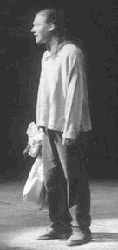
Background music swells as a chorus of three young men, serving as narrators, becomes visible behind the scrim. With colorful words they set the stage and introduce us to 'Frank,' a disillusioned soldier returning home from the Civil War. [One may remember that the character of Frank was originally to be played by Mitch McVicker, and with less than three weeks to prepare, Kevin Brocksieck (husband of Nicole) took Mitch's place. He did an excellent job, and if one had not known, one could never guess he had not originally been cast in the character.] Frank tells his parents he longs to "be God's," and they do not quite understand as he leaves them to set out on his own. In the beauty of the Great Plains, God reveals himself to Frank, and Frank bursts forth his response in "There You Are." Frank sings of how he is led and blessed by the wonders God created. Dancers behind the scrim give a moving backdrop to all the songs. Lines from the second verse take on new meaning as Frank sings,
Like this memory of what once was my home
And as I move beyond everything I've known
You pull me near
As we lay our hearts before You
Our hands are free to let go
And there You are
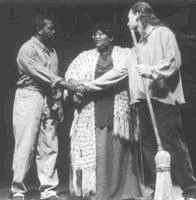
Frank sets out to explore this new experience he has found, and in his travels comes across a church which has been destroyed by the war. An old black lady, Mrs. Johnson, is singing while she sweeps it, and Frank is curious as to why she would clean a fallen-down church. In the process of telling Frank her history with the church, she points out to him that "the Church is in ruins," and implores Frank to take along her son Buzz on a mission to repair it. Buzz sings "Cry For Freedom" as a way to define his relationship to God. He says,
If this soul of mine
Could lose its weight of pride
And take to flight
I'd rise above and be free, Lord, free
To serve the One who came to be
A servant to us all
Buzz brings along his pet calf, Luke (the 'servant' Gospel), who becomes represented behind the scrim as a sort of 'guardian angel' figure. 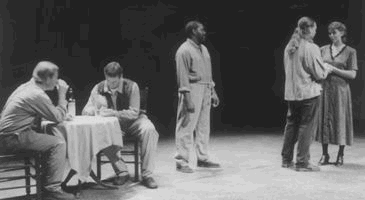 Buzz wants to go to Texas and join in a cattle drive, but Frank decides their journey should begin in Wichita, Frank's hometown. We see Wichita before Frank arrives, where two of his old friends, Clare and Ivory, are discussing their friend Frank. Ivory is the piano player in the bar where the two are talking. Ivory is not yet 'enlightened,' and criticizes Frank's pursuit of God. Clare takes up for Frank, and as their conversation heats up, Frank and Buzz enter. In one of the characteristic bursts of humor in this play, Frank walks over to them and asks, "Who is this person you are discussing? I would like to meet him."
Buzz wants to go to Texas and join in a cattle drive, but Frank decides their journey should begin in Wichita, Frank's hometown. We see Wichita before Frank arrives, where two of his old friends, Clare and Ivory, are discussing their friend Frank. Ivory is the piano player in the bar where the two are talking. Ivory is not yet 'enlightened,' and criticizes Frank's pursuit of God. Clare takes up for Frank, and as their conversation heats up, Frank and Buzz enter. In one of the characteristic bursts of humor in this play, Frank walks over to them and asks, "Who is this person you are discussing? I would like to meet him."
Frank becomes reacquainted with his old friends and explains to them what he is about, following God through searching for a spiritual 'place,' which Ivory helps to define as Dine Bikeyah, a place he and Frank dreamed of when they were children. Ivory wants to believe what Frank is saying, but it seems too good to be true. He sings, "If I Could Make It Work In Life," about how, in his songwriting, he creates a world he wishes existed, but doesn't.
And If I could make it work in life like it works on paper
If the love that I describe could be anything but words
Then I would wipe my eyes, I'd dry this ink
I'd trade my pen in on a pair of wings
And I would fly if I could only make it work in life
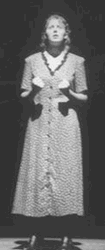
[Curiously, my two friends who were sitting on either side of me began having 'serious tears' at this point] Ivory agrees to go along with Frank and Buzz, and they all decide to go down to the church to pray before they start out. Clare does not follow them, and Frank returns to ask why she is not coming along. Clare feels she must seek God first before she joins them, and after they leave, she sings a 'prayer' for Frank, "In Your Hands." [Note: This song was playing on my stereo when my friend Marilee called to tell me Rich had died.]
In Your hands I know he
Could be a man of peace
In dying he's born again to live
In the sound of Your voice
He has finally found his joy
In Your hands
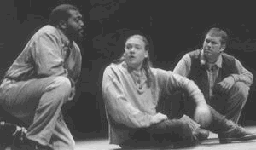
Clare's 'guardian angel' is the eagle, John. She journeys to Texas to wait for a word from God.
Frank and his two companions continue their quest for Dine Bikeyah. Out on the Plains again, Frank sings "Heaven Is Waiting," as he and his friends eagerly anticipate what God has lying ahead for them. During this song, the last song of the first act, as a memorial, photos of Rich are projected onto the scrim behind Frank as he sings:
Heaven is waiting
Just past the horizon
Just over the mesas
Across the Great Divide
And faith is blazing
This trail that I ride on
Up this mountain I'm praying
I have the strength to climb
Oh, heaven is waiting
As the second act opens, a miner, Lefty, nearly shoots the three companions who have 'invaded' his territory. Lefty is bitter and revengeful, especially towards a mountain lion who has mauled him and taken his left arm. Frank talks to the mountain lion, who, represented behind the scrim as the 'kingly' Gospel of Matthew, tells Frank he took Lefty's arm in order to 'save' Lefty from himself, and to cure him of his bitterness. Frank's companions are amazed that he has the ability to speak with animals; Lefty acquires a 'new awareness' of spiritual things. Frank sings, "Things Even Angels":
Salvation is calling
Salvation is what we need
Well it's free and it's falling
And if you look around I think you'll see
Things even angels
Things even angels long to look into
This love God rains down over you
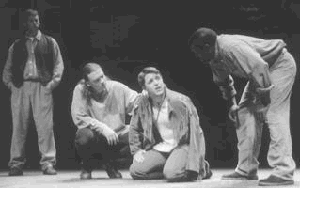
The friends ask Lefty to come along with them in their search for Dine Bikeyah. Lefty informs them that Dine Bikeyah is a real place, the land of the Navajo people, and he will take them there. Clare's eagle, John, arrives with a message from Clare, that she is now ready to join them. It is agreed that she meet them ahead in Dine Bikeyah. The eagle also delivers a lullaby from Clare, in which Clare sings the song, "Buenas Noches From Nacogdoches." Much of the dialogue in this play is very poetic, to which this review cannot begin to do justice; however, some of the lyrics of this song will give a flavor:
So this is your lullaby
That I send on the wings of this night
Wings that flutter as silent as goldenrods blooming
Bursting from bud into beauty
Ivory shares with Frank that he wishes he could also have a woman waiting for him in Dine Bikeyah. Lefty comments that he knows of a young woman there, the daughter of Chief Hastiin Nashdoi, and he will introduce Ivory to her. He also explains to Ivory that, in order to marry the girl, he would have to have a dowry, of which Ivory has none. Then Lefty hands Ivory the bag of gold dust he has been collecting for his lifetime, and indicates it is his gift to Ivory as the gold has become a weight to him, and he no longer needs it because the focus of his life has changed. Ivory is elated.
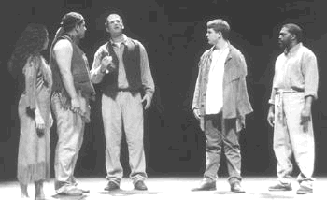
The companions are startled when they come upon a band of Navajos who are escaping Bosque Redondo [a military fort forced upon them by the whites] to return to their home. They are being pursued by American soldiers who mean to kill them. Ivory meets and falls in love with a beautiful Indian girl named Rhoda, whom he later finds out to be the daughter of the very Chief of which Lefty had spoken. Rhoda comes to represent the human face of Christ, the Gospel of Mark. She begs the four companions to leave them, or they will surely all be killed together, as the Indians have no supplies or means by which to fight. Frank's three companions choose to stay and fight for the Indians, but Frank feels fighting is not the answer, and goes off by himself to pray. 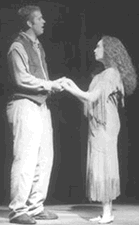 Meanwhile, Ivory gives the gold to Lefty and Buzz so that they can go with the Indians to buy supplies, among which are blankets and food. Ivory and Rhoda ponder their 'new love,' which seems so close to ending hardly before it has begun, with the coming of the soldiers. Ivory sings "Love's As Strong As Death":
Meanwhile, Ivory gives the gold to Lefty and Buzz so that they can go with the Indians to buy supplies, among which are blankets and food. Ivory and Rhoda ponder their 'new love,' which seems so close to ending hardly before it has begun, with the coming of the soldiers. Ivory sings "Love's As Strong As Death":
Love's as strong as death my love
Unyielding as the grave
Relentless as the desert sun
And rivers cannot wash my love away
Lord, I won't let it wash away
And many waters cannot quench love.
Buzz and Lefty return with the supplies, and now joined by Clare, the companions contemplate what lies before them. It is a dim forecast. Then Buzz reminds them of the power of God, that even if they die, God is still Ruler of All. He sings, "Oh, My Lord," from which his friends derive strength by remembering the stations of the cross.
The 'chorus of narrators' tells us that the next morning the soldiers decide to attack, but they are set into confusion and fire only at themselves. The skirmish soon ends, and Rhoda, saying God has "spoken to her in the night," comes as an ambassador to the soldiers and offers them aid.
The companions are glad to be alive, but are wondering what has happened to Frank, whether he is alive or dead, and if he is dead, what is to become of their spiritual quest. Clare makes them aware that whether Frank is alive or dead their quest remains the same, that perhaps Frank's role was simply one of initiation; and even if Frank is no longer with them, the burden falls on them to continue on with his vision. At this moment Frank reappears [oh, if this could but happen in real life!], full of the glorious realization that God has delivered them in a miraculous way. His companions rejoice to see him, and join him in singing, "You Are All." [Here, finally, my tears also come, caught up in this 'praise,' knowing that, in the fellowship of praise the boundaries between earth and heaven fall away, and we are joined in praising God by those who are present but for the moment remain unseen]
And here You are
Shinin' in a glory that I can see
When I look beyond myself
And I fall into the depths
Of Your love that beckons me
Well, it fills my hungerin' soul with all the riches
That are hidden in the wonders that You do
And in the words that you have spoken
There's a word that echoes still
And I can hear it in the silence of these hills
And here we are
In a light that showers from things unseen
Drawn from earth, dropped from the sky
They have crept into our lives
And called us to believe
In the One of whom the distant clouds bear witness
He was wounded, He was raised and glorified
And His voice thunders in the heavens
And it pulses through our veins
And we can find salvation
In the One, the Name
Lord, You are all
That the world could not be
You are great and strong
You are good
Lord, You are all
And everything that I could ever need
You are faith, You are hope, You are love
Yes, You are love, You are peace, You're my most high
So now I fall down on my knees and cry
You are all
Through the "Canticle Of The Plains," the Kid Brothers of St. Frank [Rich, Mitch & Beaker] have attempted to convey the life story of St. Francis to us in closer contemporary terms. The words I have written here represent only the 'tip of the iceberg' of what one may find in delving into deeper meanings of lyrics, characters, dialogues, and actions.
Recommendation: go back and read the (very long but full) commentary the brothers themselves (Rich and Mitch) make on the writing of this play, the interview given during the "Canticle" premiere. This and other related links can be found on the Intro Page.
--Sandy McMullen